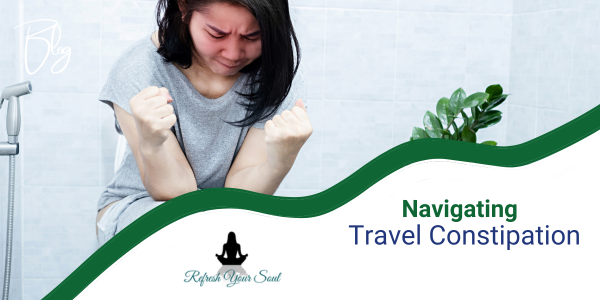Traveling—whether for leisure or business—can be exhilarating, but for many, it also disrupts a crucial part of daily wellness: regular bowel movements.
Travel constipation is a common yet often overlooked condition that affects both frequent flyers and occasional vacationers.
Understanding its causes and implementing preventive strategies can help support gut health, ensuring your journey is as comfortable as it is memorable.
What Causes Travel Constipation?
Constipation during travel is typically multifactorial. The primary contributing factors include:
- Changes in routine: Our digestive system thrives on regularity. Travel often alters meal times, sleep schedules, and bathroom habits, disrupting the body’s natural rhythm (Staller, 2017).
- Dehydration: Long flights, hot climates, and increased caffeine or alcohol intake can lead to fluid loss, reducing the water content in stool and making it harder to pass (Müller-Lissner, 2021).
- Low-fiber diet: Eating out or relying on processed, convenience foods while traveling often means a drop in fiber intake, which is essential for healthy bowel movements (Eswaran et al., 2013).
- Inactivity: Long periods of sitting—whether on a plane, in a car, or at meetings—can slow down intestinal motility (Staller & Keefer, 2016).
- Stress: Even enjoyable travel can increase stress, which impacts the gut-brain axis and may inhibit normal motility (Choung & Talley, 2018).
Strategies to Prevent and Relieve Constipation While Traveling
1. Stay Hydrated
Aim for 8–10 cups of water daily, especially during air travel. Carry a reusable water bottle to encourage consistent intake and avoid excessive caffeine or alcohol, which can contribute to dehydration.
2. Eat Fiber-Rich Foods
Incorporate fruits, vegetables, legumes, and whole grains into your meals. If traveling somewhere with limited options, consider bringing along portable fiber supplements like psyllium husk or flaxseed.
3. Prioritize Movement
Walk around during layovers, take stretch breaks on long car rides, and aim for at least 20–30 minutes of light activity daily to stimulate gut motility.
4. Support Your Microbiome
Probiotics may help maintain microbial balance during travel disruptions. Fermented foods like yogurt or kefir, or probiotic supplements, can offer support (Ouwehand et al., 2002).
5. Maintain Bathroom Habits
Try to use the restroom at the same times you normally would at home to cue your body’s regular elimination pattern. Don’t delay the urge to go—this can make stool harder to pass later.
6. Manage Stress
Practice mindfulness techniques such as deep breathing, gentle yoga, or guided meditation. These strategies support the parasympathetic nervous system, which governs rest and digestion.
7. Pack Digestive Essentials
Consider packing magnesium citrate, herbal teas (like senna or peppermint), and digestive enzymes—particularly if you know your digestion is sensitive to new foods or routines.
Conclusion
Travel constipation is an inconvenience that can quickly overshadow an otherwise enjoyable experience. Fortunately, with a few proactive measures, it is often preventable and manageable. By staying hydrated, prioritizing fiber, supporting the gut microbiome, and managing stress, travelers can maintain digestive regularity no matter where the journey leads.
References
Choung, R. S., & Talley, N. J. (2018). The gut-brain axis: A new frontier in gastrointestinal research. Current Opinion in Gastroenterology, 34(2), 81–85. https://doi.org/10.1097/MOG.0000000000000426
Eswaran, S., Muir, J., & Chey, W. D. (2013). Fiber and functional gastrointestinal disorders. The American Journal of Gastroenterology, 108(5), 718–727. https://doi.org/10.1038/ajg.2013.63
Müller-Lissner, S. (2021). Pathophysiology, diagnosis, and treatment of constipation. Deutsches Ärzteblatt International, 118(11), 191–200. https://doi.org/10.3238/arztebl.m2021.0142
Ouwehand, A. C., Salminen, S., & Isolauri, E. (2002). Probiotics: An overview of beneficial effects. Antonie van Leeuwenhoek, 82(1), 279–289. https://doi.org/10.1023/A:1020620607611
Staller, K., & Keefer, L. (2016). Psychogastroenterology: The evolving interface of brain and gut in clinical practice. The American Journal of Gastroenterology, 111(11), 1465–1469. https://doi.org/10.1038/ajg.2016.349
Staller, K. (2017). Understanding the role of routine and behavioral therapy in constipation. Gastroenterology Clinics of North America, 46(4), 735–743. https://doi.org/10.1016/j.gtc.2017.08.009

